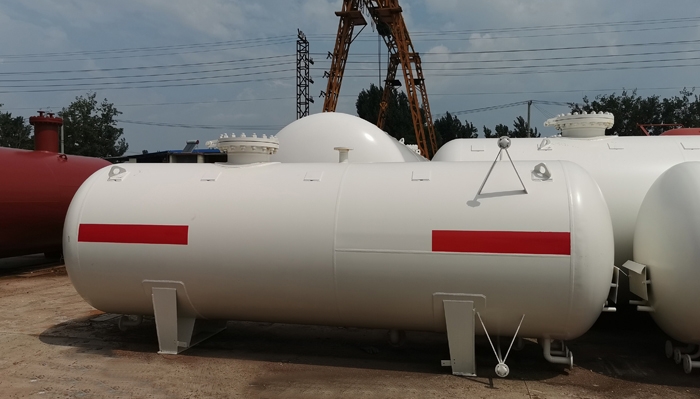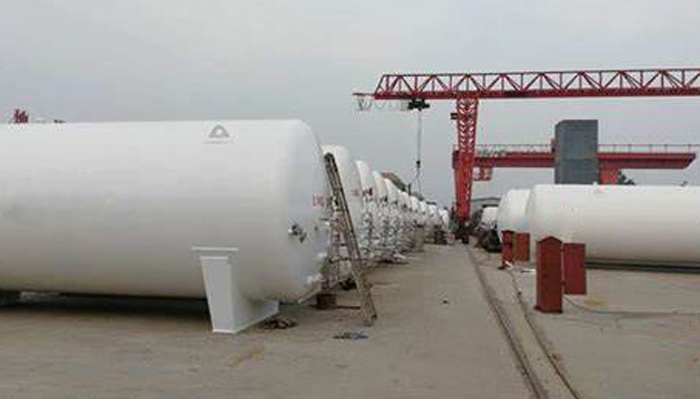Product Category
Explosion-proof measures of LPG and emergency measures in case of leakage
Date: Apr 13, 2020

Combining years of experience, pressure vessel manufacturers will share with you the explosion-proof measures for liquefied petroleum gas storage tanks and emergency measures when liquefied petroleum gas leaks to ensure the normal operation of pressure vessels.
Explosion-proof measures for liquefied petroleum gas storage tanks: The gas pressure in the gas storage tank rises sharply. If the strength limit of the wall thickness of the tank body is exceeded, the overpressure operation of the gas storage tank will occur if the safety valve fails. Due to carbon deposits in the storage tank, the mechanical impact of hard particles during movement and the sparks generated by electrostatic discharge, etc., due to poor cooling, a large amount of oil pollution and carbides are accumulated in the gas storage tank, and they are not cleaned in time, causing the carbon deposits in the tank to burn , Prone to the danger of gas tank burning.
Maintenance of liquefied petroleum gas storage tanks: Check whether the connection screws of the pipeline are loose and invalid every day. The screws should be greased to prevent the inconvenience of screw corrosion and disassembly and damage to the tank body. When checking and repairing, care should be taken to prevent wood chips, iron filings, cloths, etc. from falling into the gas tank and the duct. If the gas storage tank is not used for a long time, the water in the tank should be drained, and the tank should be kept dry. Emergency measures when liquefied petroleum gas leaks:
Emergency measures when liquefied petroleum gas leaks:
1. The local government, the environmental protection department, and the fire and public security traffic police department should be alerted, indicating the location of the accident, the accident unit, the amount of leakage, the name of the chemical, the time of the accident, whether there are staff casualties, the degree of danger and the alarm personnel Your name, phone, etc.
2. Spray water is required to suppress the steam or change the flow direction of the vapor cloud, but it is forbidden to directly impact the leaked liquefied petroleum gas or the leak source with water;
3. After cleaning, all protective clothing and equipment should be decontaminated before storage and reuse;
4. Under the condition of ensuring safety, plug or reverse the leaking container to avoid the leakage of liquefied petroleum gas.
5. To prevent leakage from entering water bodies, basements, sewers or confined spaces, it is prohibited to enter restricted spaces where liquefied petroleum gas may collect.
Explosion-proof measures for liquefied petroleum gas storage tanks: The gas pressure in the gas storage tank rises sharply. If the strength limit of the wall thickness of the tank body is exceeded, the overpressure operation of the gas storage tank will occur if the safety valve fails. Due to carbon deposits in the storage tank, the mechanical impact of hard particles during movement and the sparks generated by electrostatic discharge, etc., due to poor cooling, a large amount of oil pollution and carbides are accumulated in the gas storage tank, and they are not cleaned in time, causing the carbon deposits in the tank to burn , Prone to the danger of gas tank burning.
Maintenance of liquefied petroleum gas storage tanks: Check whether the connection screws of the pipeline are loose and invalid every day. The screws should be greased to prevent the inconvenience of screw corrosion and disassembly and damage to the tank body. When checking and repairing, care should be taken to prevent wood chips, iron filings, cloths, etc. from falling into the gas tank and the duct. If the gas storage tank is not used for a long time, the water in the tank should be drained, and the tank should be kept dry.

1. The local government, the environmental protection department, and the fire and public security traffic police department should be alerted, indicating the location of the accident, the accident unit, the amount of leakage, the name of the chemical, the time of the accident, whether there are staff casualties, the degree of danger and the alarm personnel Your name, phone, etc.
2. Spray water is required to suppress the steam or change the flow direction of the vapor cloud, but it is forbidden to directly impact the leaked liquefied petroleum gas or the leak source with water;
3. After cleaning, all protective clothing and equipment should be decontaminated before storage and reuse;
4. Under the condition of ensuring safety, plug or reverse the leaking container to avoid the leakage of liquefied petroleum gas.
5. To prevent leakage from entering water bodies, basements, sewers or confined spaces, it is prohibited to enter restricted spaces where liquefied petroleum gas may collect.
Send Your Inquiry
We not only provide a good product, but also provide high quality service. If you are interested in our products,
you can contact us in the following ways.
you can contact us in the following ways.







